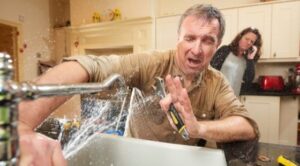
Plumbing Preventive Maintenance Tips for Homeowners
We are all aware of how critical it is to keep the water flowing and the pipes in our houses in good operating order. Unfortunately, every now and again, a plumbing issue will develop. If you’re handy, you can make your own solution. If the issue is beyond your competence or you are downright unhandy, you may contact your Appleton plumber for assistance. However, there are numerous steps you can take to avoid such plumbing issues from arising in the first place. Here are some tips for Plumbing Problem Prevention In Appleton WI.
Here are five suggestions for avoiding plumbing issues in your home:
The proper technique to flush. Of course, there are many items that you already know should not be flushed down the toilet, such as your child’s stuffed animal and your mobile phone. However, there are several products that seem to be safe for flushing but are not, such as:
- Tissues – even though they are made of paper, they are not meant to degrade in the same way as toilet paper does.
- Baby wipes — any sort of wipe, including those labeled “flushable” — are not meant to degrade and may even get “trapped” in pipes if little roots have entered them.
- Hair (and dental floss!) – although seeming to be innocuous, it may build a net that becomes entangled in the pipes and never disintegrates.
- Medication — may disintegrate and enter the water system, causing negative environmental impacts.
Cigarette butts are loaded with harmful chemicals and are notorious for clogging drains. - Bleach – if you’re using it to clean your toilet, you may be astonished to hear that it’s too harsh for your septic systems and pipes.
When it comes to flushing, a basic rule of thumb is to limit paper products to toilet paper alone and to use vinegar or commercially available items intended exclusively for cleaning toilets.
Make use of the proper plunger
A plunger is the “old faithful” of drain unclogging, but did you know there are three distinct varieties of plungers, each with its unique use?
- The plunger for the cup. This is the most common sort of plunger and the one you’re most likely to recognize. It features a rubber cup for a handle. The cup plunger works best on things like flat surfaces, creating a suction effect that helps to release obstructions. It is mainly beneficial for sinks and tubs in bathrooms and kitchens.
- The plunger with a flange. Like the cup plunger, this plunger has a cap on the end of a handle, but it also includes a rubber flap that folds out from within the cup. This cup/flap combination fits snugly over a curved toilet drain, providing the suction required to dislodge a blockage. The flap may be folded within the cup to provide a flat plunger if necessary.
- The plunger of an accordion. This plunger seems to be exactly what it sounds like: a plunger with accordion-style pleats. This plunger is made of hard plastic and can provide a lot of suction, but it may also damage surfaces. Therefore, it is solely appropriate for toilets.
Look for any leaks
A little drop might quickly grow into a larger, more expensive leak. Water leaks may reduce your water pressure and cause structural damage to your property, such as wood rot and pipe corrosion. Check your home’s plumbing for drips and leaks regularly – the bathrooms and equipment that requires water (dishwasher, washing machine, water heater). Paying attention to leaks as soon as they appear might save you a lot of headaches in the long run.
Take care of the kitchen sink
Foreign objects cause most blockages in the kitchen sink and disposal. Never pour oil, fat (which may congeal), or fibrous food debris down the toilet. You may also place a screen over the drain to capture food that has to be thrown away. Before pouring food to the disposal, switch on the water and the unit; let the water run for 15 seconds after that to guarantee all food waste has been flushed down the line.
Understand how to turn off the water
If you have a significant leaking pipe, frozen pipes, or other water calamities, you must know where your main shut-off valve is. The valve is usually always positioned near the exterior boundary of your home, and it is always on the ground level, basement, or crawl space. If your house is constructed on a slab, the shut-off valve will likely be near the water heater or under the kitchen sink.
Contact Tureks Plumbing Today
There may be occasions when you just need a professional plumber to complete the work, so make sure your list of repair professionals includes a certified, dependable local plumber. Tureks Plumbing provides excellent, dependable plumbing services in the Appleton WI region. We are completely licensed, insured, and bonded. We provide affordable prices as well as a 100% Satisfaction Guarantee. Allow us to assist you with any plumbing issues, large or small. Call us immediately to arrange a repair service or a full plumbing inspection.

